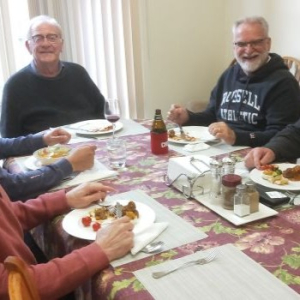Peter MALONE
A farewell to Kew
A farewell to Kew
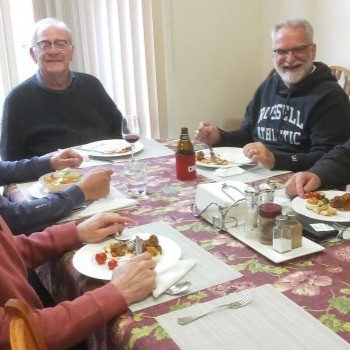
With the closure and sale of our house at IA Mountain Grove, Kew, the Melbourne community celebrated a farewell and blessing.
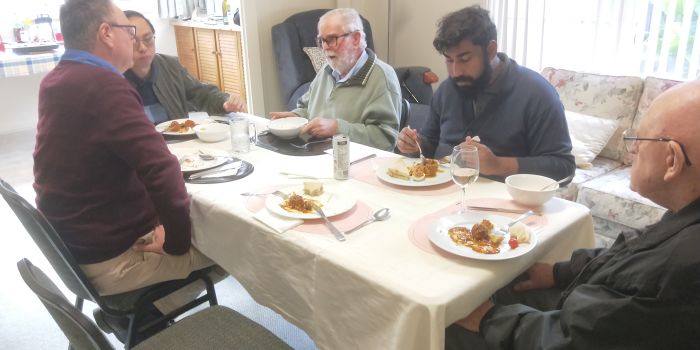
We have had a community living at Kew since August 1988. A count tells us that 21 confreres have lived some time in the house, and many visitors.
The blessing was for Paul Castley and Philip Malone.
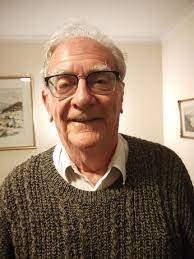
Paul came to Melbourne, to Croydon, in 1981 and, apart from 1986-1987 at Navarre, Drummoyne, he has lived in Melbourne. He worked in pastoral formation at Croydon, at the National Pastoral Institute, at Heart of Life, with a special focus on Clinical Pastoral Education, also with an extensive parish supply ministry, and chaplain to the Teams of Our Lady.
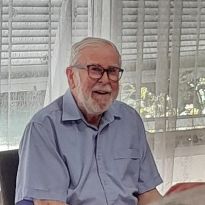
Philip came to Melbourne, to Kew, in 1999. He taught Moral Theology and Liturgy at the Yarra Theological Union and other theological and pastoral formation centres, at Heart of Life, and other consultations. He worked in parish supply and, for many years, at Loreto, Mandeville Hall.
Both Paul and Philip spent several terms each as Community Leader.

The Melbourne community gathered at Cuskelly House, Blackburn, for the farewell, prayer, sharing and a meal.
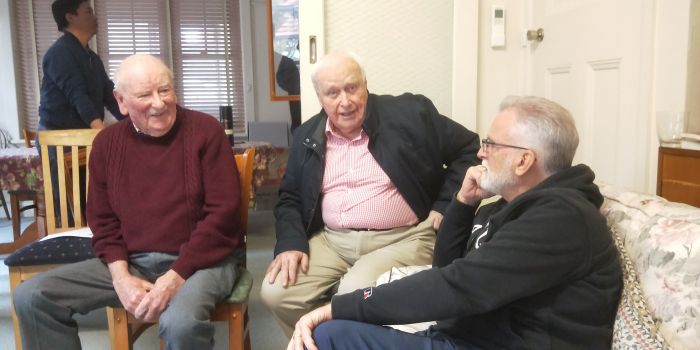
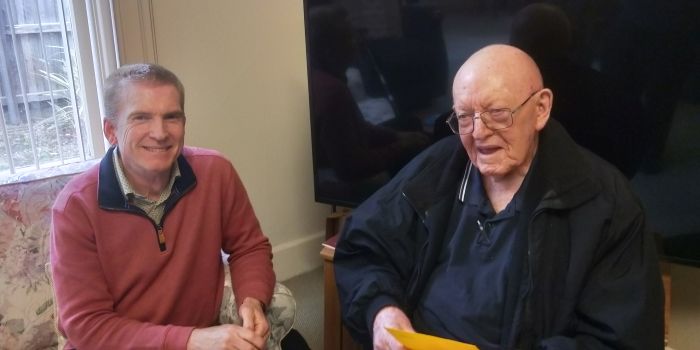
(Tim Brennan was also present – some scrutiny of the new arrivals for Kensington Monastery?)

In the Lost Lands
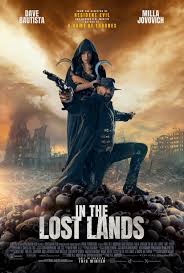
IN THE LOST LANDS
US, 2025, 100 minutes, Colour.
Milla Jovovich, Dave Bautista, Arly Jover, Amara Okereke, Fraser James, Simon Loof.
Directed by Paul W.S.Anderson.
The immediate attraction point: based on a short story by G.R.R.Martin, celebrated author of Game of Thrones. This is a short story, featuring a witch, Gray Alys, her being commissioned by a queen to fulfil a plan to take over opposed-apocalyptic community, but intending to write more stories with this character – but this has not eventuated.
The Dir is Paul W.S.Anderson, British Dir who moved into action films, six Resident Evil features, for Death Race films. And, with the resident evil films and others, featuring his wife, Mila job of each. And she is the star here. And she is teamed with Dave Bautista, star of many action films. The supporting British cast as well as Polish, as the film was made in Poland.
The film opens with the attempted hanging of the witch, a fierce female Inquisitor presiding, and guards dressed in rather media evil uniforms. Then, enter Boyce, Dave Bautista, with cowboy hat and gun, intimations of the spaghetti Western. When the witch and Boyce team up, they travel through a pokes apocalyptic industrial site, memories of mad Max films, as well as travelling in films like The Book of Eli.
The audience has to be attentive to follow the twists of the plot, all of the witch, the later revelation of the Queen and her plot, her killing of the overlord of the community, a liaison with the courtier, her pregnancy and ambitions – and Boyce as the father.
A lot of action adventures along the way, the budget spent on the grim look of the post-apocalyptic world, special effects, creatures attacking, the survival of the travelling duo, yet suspicions, bonding, and final twists, especially with Boyce emerging as a shape shifter on a mission to destroy the witch. However, she is more shrewd, is trying to get to the Valley of Skulls, Boyce leading her, even saving her from a desperate train ride on a train going over a destroyed bridge.
A lot of the explanations are left until the end, who is plotting with whom, the repercussions, Boyce and resurrection, the control of the witch… And, perhaps, many audiences hoping that Martin will write another story and Anderson will film it.
Wallace and Gromit: Vengeance Most Fowl
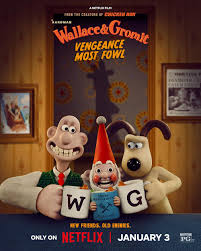
WALLACE & GROMIT: VENGEANCE MOST FOWL
Voices of: Ben Whitehead, Peter Kay, Lauren Patel, Reece Shearsmith, Diane Morgan, Adjoa Andoh,Lenny Henry.
Directed by Merlin Crossingham, Nick Park.
Older audiences may remember with joy, 1989, and the first appearance of Wallace and Gromit on our screens, Great Day Out. The villain back in those days was the Penguin, Feathers McGraw. This Wallace and Gromit outing is the sixth – and they won an Oscar in 2005 for Wallace and Gromit: Curse of the Were Rabbit.
Audiences have got to know and admire Aardman Studios and their particular style of animation as well as the characteristic voices. Wallace is the traditional British bachelor, self-sufficient, eager with his inventions, but happy to have his dog, not his pet, his friend Gromit sharing the house. But, by this stage, Gromit is feeling somewhat left out, Wallace caught up in his inventions.
However, they do have a moment of glory, capturing Feathers McGraw who has stolen a diamond from the Museum and is now imprisoned, in a zoo. Vengeance is uppermost in Feathers mind.
But, the creativity of this story is that Wallace invents a robot, love of AI, a robot called Norbot, at the service of everyone, all of initiatives, the most rapid achievement of jobs beyond expectations. Gromit is not so impressed, especially the noise that Norbot takes in recharging, Gromit taking the charger outside – and its being linked with Feathers in his prison.
Dastardly results.
Feathers is able to create a whole legion of Norbots, all malevolent, doing the jobs, robbing the customers, creating uproar, and the police, racial backgrounds of Macintosh and Mukherjee, stubborn Scot and eager Indian deciding that Wallace is the criminal. There is also some parody with the media, a reporter called Onya Doorstep, and a television commentator, Anton Deck (based on televisions Ant and Dec).
Poor Wallace in jail. Gromit doing his best to remedy the situation, Norbot rescuing him from a tree, falling and Norbot recovering his benevolently programmed self.
All set for a confrontation, Feathers McGraw trying to make his getaway with the rogue robots, but, of course, Wallace innocent and he and Gromit able to live another day (with Wallace resolving to cut down on his inventions).
And thanks to Nick Park for many decades of entertainment from Aardman, especially with Wallace and Gromit.
Bird/ 2024

BIRD
UK, 2024, 119 minutes, Colour.
Nykiya Adams, Franz Rogowski, Barry Keoghan, Jason Buda, Jasmine Jobson, Frankie Box, James Nelson-Joyce.
Directed by Andrea Arnold.
A British slice of life. This time in south-east England, Kent, the area where director, Andrea Arnold, grew up. In fact, Andrea Arnold’s first film is, in the 2000 is, work British slices of life. However, she also directed a version of Emily Brunty’s Weathering Heights and also went to the United States American and to direct episodes of television series, like Big Little Lies.
However, here she is at home again. This part of Kent is not an area for easy living, especially for the young teens, trying to make their way, and dealing with parents who are only 14 years older than they are. They have to be tough, have to manage, had to learn by their own mistakes but especially what they see in their parents.
This is the story of Bailey, 12 years old, West Indian ancestry, local English ancestry, a bravura and strong performance from Niliya Adams, we first see her with her phone, photographing birds, this would and grace of birds, and we are alerted that this will be a theme, both realistic and symbolic, as the film progresses. Then she is picked up by her father, and together, on the scooter, they speed and swoop through the town, landing at home where her father, Bug, Barry Keegan in another quite different performance, and announces that he will be getting married to his girlfriend at the weekend. Bailey is not impressed.
Also at home is her half brother, Hunter, Jason Buda, 14, involved with a local gang who terrorise locals with their camera, photographing stuff that they can blackmail their victims with. And Hunter wants to
run away to Scotland with his 14-year-old girlfriend, Moon. One of the symbolic bird sequences has Bailey trying to deliver Hunter’s letter to Moon the bird swoops, snatches the letter in its beak and delivers it. Touches of “magic realism” throughout the film.
But we discover that the Burden of the title is actually Laura, played by François rib Gorski, encountering Bailey, strange clothes, but on a quest to find his birth mother.
Which turns the narrative into a search, a quest, Bailey taking on Bird, a joyful excursion to the seaside with the half brother and sisters who live with her birth mother, discovering Birds father and some explanation if not joy.
There is some happiness in this family’s life, Bogeyman Bailey bringing Hunter home from his forlorn search for Moon, the wedding celebration is an exuberant dancing, and a visit from Bird, the audience seeing him from Bailey’s viewpoint, covered in feathers, protecting bird, a flyaway bird.
Bailey is only 12. And all her life is before her. We might wonder how Andrea Arnold saw Bailey’s future.
- The title? The character, Bird? Bailey and her photographing birds? The range of birds, real and symbolic throughout the film? The real/symbolic bird and carrying Hunters message?
- The Kent setting, the town, houses, narrow streets, the coast, the surrounding countryside? The travel to the sea, the water, the sand, the day of the Sea? The musical score, the wide range of songs, their insertion into the action, the lyrics?
- The slice of social realism? Families living in Kent, their backgrounds, early relationships, pregnancies and births, homes, work, scams? The Dir is interested in these characters, their backgrounds, sympathy?
- The central focus on Bailey, her age, strength of character, her hair and later getting it cut, riding on the scooter, riding with Bug, Bug as her father, living with him, with Hunter? Her mother, the other relationship, her children? The influence of these situations on Bailey and her approach to life?
- Bug, father at 14, his partner and her new partner and family, Bailey and Hunter living with him, his role as a father? His fiancee, the announcement, the planning for the wedding? The scooter ride, the total and the phosphorescence, planning to sell it to finance the wedding? At home, his dancing, gyrations? The buildup to the wedding? His care for Bailey, her presence, her absences?
- The appearance of Bird, sudden, his manner, look, closing? The meetings with Bailey, her wariness, bonding with him, his stories, searching his mother, appearing and reappearing? Travelling with Bailey, the day at the beach? With the other children, meeting her mother, getting information, the travel to the house, the man unwilling to speak, coming down to them, the explanation of Birds background? Finding some answers, his disappointment? His appearance of the wedding, the touches of magic realism, Bailey seeing him as a bird with feathers, protective? The final meeting, the departure, realistic, and the feathers?
- Hunter, his gang, the videos, trapping victims, hoodlums? His relationship with Moon, wanting to run away, getting Bailey to deliver the message, Bailey at the door, the vigilant bird, taking in delivering the message? Hunter leaving home, telling Bailey, going to the railway station, her telling Bug, the going to the station, bringing him home?
- Bailey visiting her mother, taking the children to the beach, the joy of the family? Her mother’s boyfriend, his violence, outbursts, confrontation with Bailey?
- The background of characters, their life and style, issues of relationships, commitments, values, survival?
Time Cut
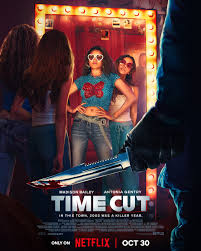
TIME CUT
US, 2024, 92 minutes, Colour.
Madison Bailey, Antonia Gentry, Griffin Gluck, Samuel Braun, Megan Best.
Directed by Hannah MacPherson.
The first years of the 2020s saw a proliferation of horror films, many of them slasher stories. This is one of those. However, it is one of the better examples of the genre and has a wider appeal.
On the one hand it could be described as a serial killer film. And it is. On the other hand, it could be described as a time travel film. And it is.
For the 2003 timeline, there is a focus on young students, friendships, secrets, proud parents, socials, and the serial killer.
For the 2024 timeline, things are much more sober, the parents have a younger daughter but are still grieving the death of their daughter 20 years earlier, almost ignoring the present daughter. However, the contrivance is that she is taken back to 2003, encounters her sister, tries to intervene to stop of the killings, has communication with the teacher from school, and becomes very friendly with a rather nerdish student interested in time travel.
The screenplay is often quite ingenious as it moves from time to time, especially the role of time travel in the identity, motivations and unmasking of the actual killer. And, yearning for the past, the heroine decides to stay in 2003 with her surviving sister, with affirming parents, rather than her cold life of 2024.
- The combination of serial killer thriller and time travel? Credibly combined?
- The title, incorporating each of the themes?
- The popularity of the film, well-received? A young adult audience?
- The town of Sweetly, Minnesota, 2003, vibrant and lively, the look, style, language, technology? The contrast with 2024, downtown neglected, the preoccupations of the inhabitants? The musical score?
- Summer and her story, her parents, at class, friendship with Emma, the class celebration, the history of the two deaths, the Masked Slasher, Summer, morose, attacked, the escape, her death?
- 2024, Lucy, with her family, the parents morose, not affirming their daughter, her skills at school, intelligence, science, NASA? At school, the professor? The people discussing the mystery, not solved? The Memorial at the shrine?
- The discovery of the time machine, Lucy using it, arriving 2003, two days before Summer’s death? Her consulting the teacher? The encounter with Quinn?
- Quinn, victim of bullying, interest in science, reclusive? The clash with Ethan? Lucy, helping, the explanation, his help with the refuelling of the Time Machine? The ingenuity of restarting the machine?
- Lucy, going to visit her family, the difference in their personalities, their encouragement of Summer, Summer not so much interested in her studies, Lucy offering to help her?
- The mall, the murders, the death of the guard?
- The effect on Summer, Lucy finding Quinn’s letter, his love for Summer? Summer declaring her love for Emmy? The setup for her death, Lucy saving her?
- The revelation about Quinn, his motivation, his time travel, Lucy returning, encountering the future Quinn, confrontation and his death?
- Lucy, not finding a place in 2024, deciding to stay in 2003, with Summer, with a happy family, and the apprenticeship with NASA?
- The successful combination of slasher themes and time travel as well as family issues?
Grey Lady
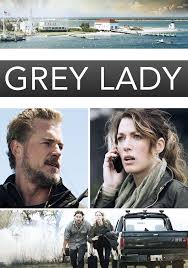
GREY LADY
US, 2017, 107 minutes, Colour.
Eric Dane, Natalie Zea, Amy Madigan, Adrian Lester, Carolyn Stotesbery, Chris Meyer, Rebecca Gayeheart, Laila Robbins, John Shea, Billy Sherry, Rafiki Rocky Rodrigues, Eilin O'Dea.
Directed by John Shea.
Grey Lady is a police investigation with a number of murders to be solved. And, the title refers to the island of Nantucket, inclement in its off-season.
For those who want to sit back and enjoy this kind of thriller, there are certainly intriguing elements. Some reviewers refer to the intricacy of the plot lines – while others just simply label the episodes as chaotic. It will depend on the viewer’s frame of mind at the time of watching.
The film was directed by veteran actor, John Shea, who also appears as the local police chief. The star of the film is Eric Dane as the investigator, emotional because of the death of his sister and of his partner, trying to investigate the background of family members. It is interesting to see British actor, Adrian Lester, as one of the local police and there is a tour de force performance by Amy Madigan as the mysterious aunt.
Lots of atmosphere. Quite a number of killings. All kinds of intricacies in the tangles of the plot and the solution.
- The title, the island of Nantucket, its weather, nothing being either black or white?
- The American movie tradition of police investigations, murders, mysteries, detection, serial killers and motivations, sanity and insanity?
- The introduction to Doyle, the paper headlines of the death of his sister, his partner, Maggie, discovering her pregnancy, the callout, the screaming, Maggie tending the woman, the woman killing her, Doyle and his confrontation with the man, his eyes, the escape? Maggie and her death, the Rose and the Crown? Consequences, Doyle and his suspension, forbidden to continue investigating, his defiance, the travelling to Nantucket?
- Doyle, his personality, the significance of the happy opening sequence, the family, his father? The later return to the photo? The ambiguity of his father, the revelation of the relationship with Lola, his father and Lola and the fight, his uncle’s death, his coming into the room, assuming his father had killed his own brother? And the focus on Beth as a little girl, watching everything, traumatised?
- Doyle, personality, taciturn, unsmiling, determined, the burden of his past, the death of his sister and partner? On the boat, meeting the Duchess, and meeting Eli? Johnson, his welcome, the police on the island, not wanting Doyle to investigate? The tensions? The collaboration with Johnson, Johnson and playing in the band, the bond? And Doyle getting information from his colleague back in Boston? The authorities in Boston?
- The events on the island, the exhibition, Billy and the sculptures, Melissa and her paintings, Doyle attracted to the woman in the bath, memories of his partner, buying it, the celebration afterwards? Eli and her spilling wine on the painting, the apology, joining in the gathering afterwards? The meetings with the Duchess, the divorce, the intensity of her businessman husband, her death?
- Doyle, getting more information about his family, the visit to the house, Tony and his collaboration and information, seeing Angela – and the later revelation that Angela was Lola?
- Doyle and Melissa, the bonding, the discussions, revelations, Melissa and her tensions? Clara, Irish, massage, friend?
- The revelation of the audience of who Eli was, her collaborator, revealed as her brother, Perry? The discussions between them, Eli as Beth, her trauma, orphanage, institution, escape, collaboration with her brother, the religious language and motivations? The revenge for the death of her father, blaming Doyle for his father’s killing of her father, the series of murders of relations and friends, and the symbols on the victim spelling out Doyle’s name?
- Eli/Beth and her charm, yet her madness, manipulation, violence, vengeance, control of Perry? Perry and his violence? The episode with Tony, blindfold, cutting off his fingers, the confrontation and the pursuit? The confrontation with her mother, threatening, unable to shoot her? The episode with Clara, the massage, locking Beth in, Perry and the guns, the confrontation, Beth killing Clara, the disposal of the body, the manoeuvres to track Melissa, the phone calls, confronting her, telling her of the death of Clara, Melissa’s collapse, the boat, abducting her?
- Doyle, putting the pieces together, working with Johnson, information from Boston? The meeting with Lola, revealing the truth, the flashbacks to what happened, the fact that Lola had killed her husband, but the little boy had seen only his father with the weapon? The whispered promises in the church? Builders gift of his father’s camera?
- The final confrontation, with Beth, threatening Melissa, her death? The confrontation with Perry, the gun, the revelation of Lola’s secret, that Perry was in fact Doyle’s brother, not being able to kill him? The arrest?
- The end, to going back to Boston, farewell from Johnson, the praise of the local authorities, the final talk with Melissa, and the story throwing the coin at the lighthouse – and the flashbacks to the memories, Doyle’s father and the camera, the whole family the throwing coins, and the irony of their return?
Hold Tight
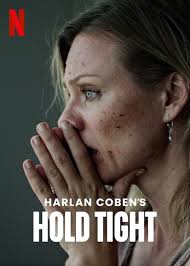
HOLD TIGHT
Poland, 2022, 6X 45 minutes, Colour.
Magdalena Boczarska, Leszek Lichota, Krysztof Oleksyn, Grzegorz Damiecki.
Directed by Michal Gazda.
Harlan Coban’s novels have been well received critically and are very popular. The film version of one of his novels, Tell No One, was made in France in the early 2000’s.
However, Coban made a contract with Netflix for the filming of many of his novels. Interestingly, most of them have been set outside the original locations in the United States. Many of the stories have been transferred to the United kingdom, there was a French film, a Spanish film, and two Polish. This is one of the Polish series.
The focus here is more local than the international scope of many of the series. The focus is on a family, a strong-minded mother, a laid-back father, the death of a student, drug dealing connections, and the disappearance of their son who was involved with the dead student.
While there is a great deal of attention to the students, their interactions, the drug deals, the investigations, the principal focus is on the mother of the boy who has disappeared, a powerful performance by Magdalena Boczarska.
As expected, there are several strands in the plot, revelations and various unanticipated interconnections between characters. There is also attention to the investigators, manner, scepticism, touches of comedy, but always serious.
And, a satisfying explanation of the intricacies of the plot.
- The popularity of Harlan Coben novels? Adaptations as television series?
- The transition of the story to Poland, Warsaw, the atmosphere of the city, the views of the city, 21st-century and modern, the affluent suburb, the refuge for youngsters – and cover for drug dealing? Police precincts and investigations? The musical score?
- The focus on Anna, her age, marriage to Michall, their son, their daughter, the protective mother, surveillance on her son’s phone, her husband’s hesitation? The disappearance of her son, her anxieties, desperation? Going to the club, her being beaten up, the rescue, the injuries? The death of Igor? The connection with Adam and his disappearance? Beata and her visits, grief for her son, discussions with Anna? Visit to the site of Igor’s death? The discussions with Paul and his wife, his role as a lawyer, his wife as a counsellor, at the school, the memorial for Igor? Ols and her friendship with Jasmine, Jasmine’s father, sleepovers, the humiliation of Jasmine at school, the teacher, the consequences? Anna and the police investigation, her work, sports, drugs, prescriptions missing, the investigation, arrest? Her continued interventions?
- Michal, good man, expert, flying and the press conference about the fire? Support of his wife, love for his son, his daughter? Listening to Anna? His interventions, going to the club, the confrontations? The DNA, the impact of finding Adam was not his son, the confrontation with Anna, her explanations, the rape, his disbelief? The further search for Adam, the phone calls? With Paul? Paul suggesting the lawyer, the meetings, the confrontations? The reconciliation with his wife?
- Adam’s story, his age, going to the club, the manager and her hold over him, the drug distribution, his close friendship with Igor, Igor’s death, the investigation, his disappearance, the false phone calls, his girlfriend and her concern, his being held by the two boys, phones with the Czech connection, the attack on him, his escape, confrontation with the manager of the club, the thugs? His watching his parents? The eventual return, the explanations to his mother, Igor and the stealing of the prescriptions, his proclaiming his innocence, the reconciliation with his girlfriend – his mother’s declaration for protecting him, but the final images of her suspicions?
- Paul, lawyer, his wife and psychology, friendship, interventions, getting the lawyer, his daughter, demands on her, exasperations? Her love for Adam, at school, the friends, the parties, the drugs, her friend being abducted and tortured, her going to the club, the confrontation, the dangers?
- The group of young people, the drugs, parties, violence, Guru, the manager, her hold over them, the thugs and their brutality? Holding Adam? His escaping, the consequences? The leader and his father, lawyer, finding out the truth about his son, his connections with the manager of Guru?
- The shop proprietor, separation from his wife, the humiliation of his daughter at school, confrontation with the teacher, the teacher and his apologies, going to his house, harassing his wife? Revelation that he had hired the abductor, their past together in Afghanistan, his criminal attitude, the young girl, abducting the ex-wife, torturing and killing her, the search for the videos, the abduction of her friend, torture, the police interrogating her husband, her death? The revelation that the proprietor was sending compromising videos to the teacher, his past behaviour, humiliation? His confronting the abductor? The abduction of the young girl, torture, her escape, the pursuit through the railyard? The young woman letting her go?
- The police investigation, the attitude of the chief investigator, his sayings and their being inappropriate, the range of interviews, the witnesses, the breakthroughs, the subordinate staff and their hostility towards the female officer, his employing her, their working together, the interrogations, clues? His thoroughness? With Anna and her husband? The personalities of the police, the young awkward policeman, his breakthroughs, the interviews, his misinterpretations?
- The manager at Guru, her control, connections, violence?
- Igor dead, his presence in the film, the site of his body shape and the candles? His mother? The revelation of the truth?
- The personal dramas, the interconnections, crime, mysteries, twists?
Order, The

THE ORDER
US, 2024, 116 minutes, Colour.
Jude Law, Nicholas Hoult, Tyler Sheridan, Jurnee Smollett, Walter Slezak, Odessa Young Alison Oliver.
Directed by Justin Kurzel.
The events in this investigative thriller took place in the 1980s. But, a film about extreme right-wing groups in the United States in the 2020s will immediately alert audiences to the attack on the American capital, January 6th, 2021. And, in fact, at the end of the film, the link is made.
The name, The Order is taken from the 1977 novel by William L.Pierce, the Turner Diaries, seemingly intended for younger readers but something of a manual for an uprising against the state, and how it is achieved in stages. This book features in the film highlighting its influence. Already, in 1988, there was a film about these events, Betrayed, directed by Costa Gavras and featuring Tom Berenger and Debra Winger. Early in 1989, the book on which this film is based was published. Its title, The Silent Brotherhood: Inside an American Racist Conspiracy, by Kevin Flynn and Gary Gerhardt. Kevin Flynn is noted in the credit as a consultant for the film.
The film has been directed by Justin Kurzel, well noted for his crime dramas and his skill in portraying mentally and emotionally disturbed men – especially in Australia, The Snow Twown, The True Story of the Kelly Gang, Nitram (and not forgetting his Macbeth).
The framework of this story is the investigation by FBI agent, Terry Husk, a fine role for Jude Law, one of his best (his role before this one as the ageing Henry VIII in The Firebrand). He works in collaboration with an earnest young deputy, Jamie Bowen, played by Tye Sheridan, and a local agent played by Jurnee Smollett. The setting is Washington State – so much of the scenery, the mountains, filmed beautifully as background.
At the centre of the brotherhood is a young enthusiast, all-American, Bob Matthews. This is a very interesting and different performance by Nicholas Hoult who resembles closely the photos of Matthews himself, at times baby faced, an innocent despite the prejudices and violence he is spouting (scenes of his intensity in close-up looking like Nicholas Hoult more than 20 years earlier as a boy in About the Boy). The actual Bob Matthews, we find there is a strong resemblance between him and Nicholas Hoult.
Terry Husk has his own personal problems, his long career, sometimes an intense recklessness in pursuing the criminals. Matthews has the support of his wife, of his pregnant girlfriend, of a lot of the Proud Boy types of the 1980s, moving to bank robberies, explosions to distract from the robberies, a Bricks job on the highway, building up his coffers to start a militia. The screenplay also emphasises the biblical underlining of this Brotherhood, the transfer of promised land to the Jews (to be taken away from them), to the white Americans who see themselves as God’s chosen people, ready to rise up against any immoral society and a two-permitting government.
The pace is strong. The characterisation powerful. The issue is more than challenging. And, while it is a reminder of movements in the past, The Unibomber, bombings in Oklahoma, Waco… It is a sober alert to movements, beliefs, conspiracy theories in Trump’s America.
- The title, the reference to the book, The Turner Diaries, the manual for insurrections and the group called The Order?
- The film based on fact, the 1980s, the book basis for the film, The Silent Brotherhood? The popularity of white supremacist groups at this time? The Reagan era? The social standing of members of the group, white groups, the biblical basis, church preachers, neo-Nazi attitudes, the active leaders and insurrection, turning to crime to finance militias?
- The settings, Idaho, Washington state, the beauty of the mountain scenery? The city sequences, the streets, banks, porn cinema and explosions, homes, the church, the highways and robberies?
- The focus Terry Husk, Jude Law’s performance, FBI background, moving to Idaho, the phone call and the separation from his wife and daughters, his long experience, long friendship with Joanne Carney, working with her, her authority and jurisdiction, tested by Husk and his taking initiatives? The work together, investigations?
- The focus on the group, Richard Butler, as a church minister, his ideology, preaching, the Bible, white supremacist presuppositions about the land, anti-Semitic, swastikas and neo-Nazi attitudes? His meetings with Bob Matthews, the threats, Matthew standing up to him at the gathering, his withdrawing?
- Bob Matthews, his background, age, manner, relationship with his wife, relationship with his girlfriend, her pregnancy? His friends, their thug background? Interviewing the Mexican who pretended he was Spanish for racial supremacy? His hold over the men, his leadership? Later, the arrest and Husk interviewing and getting information?
- The decision to rob banks, the money, for themselves, but for funding a militias? The sequence of the robbing of the bank, intimidation, the driver and the getaway, his gun on the policeman outside, their exhilaration? Matthews and his wife and his girlfriend? The planting of the bomb in the cinema, a distraction, the robbery of the van? The bigger plans, the Brinks van, on the highway, the hold-up, cars on the highway, the chain across the road, their effectiveness, the dangers, guns and shooting, escape?
- The local police, the chief, rather more easy-going, Jamie Bowen, his earnestness, relationship with his wife, children? Giving information to Husk? Husk relying on him, going to the motel, the stakeout, the gun, Jamie freezing, Husk and his reaction? His change, becoming more involved, going into action? Husk and the interview with his wife and her fear of him? The confrontation, the shootout, the chase, Jamie shot, his death? The funeral, Husk, Jamie’s wife?
- The focus on Bob Matthews, his personality, relationships, his plans, his wife, unable to have children, the young girlfriend and the birth of the child, the money for them? Husk and his interview, getting information, the location for hide out?
- The impact of the church gathering, Butler speaking, Matthews intervening, powerful speech, bigotry?
- The hideout, the thugs, guard, the FBI attacked, the siege, the shooting? The fire, Bob Matthews staying, Husk going into the building, withdrawing, the collapse of the building, Matthews’ death?
- Husk and his achievement, Joanne Carney and her work, the regrets for the death of Jamie Bowen? The atmosphere of uprisings in the 1980s?
- The final information, the references to January 6th, the siege of the Capitol, The Proud Boys and other groups, imprisonment, President Trump pardoning them – and the future during the second Trump presidency?
Companion
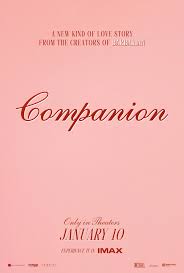
COMPANION
US, 2025, 97 minutes, Colour.
Sophie Thatcher, Jack Quaid, Lucas Gage, Megan Suri, Harvey Guillen, Rupert Friend, Mark Mancaka.
Directed by Drew Hancock.
At the end of watching Companion, this reviewer was very happy to have had no knowledge at all of what the film was about or what it was like. And, checking on the number of reviews as well as strong opinions from bloggers, most were pleased that they went in to see Companion cold and found it an engrossing and unexpected experience.
Which, possibly, is where a review of Companion should end. But, it is probably fair to say that in the first few minutes, we are introduced to a very interesting character, Iris, played by Sophie Thatcher (Heretic, Yellowjacket) in a supermarket romantic comic episode involving the collapsing of the oranges shelf, then a startling remark by Iris, the introduction of the tall handsome, Josh, Jack Quaid. Then, off we go…
Sophie Thatcher is very effective in keeping pace with the various facets of her character.
One all the best aspects of Companion is that we do not know where the film is leading. And, there are quite a number of surprises in the screenplay, some misleading, some turns, some twists as the plot unrolls, unravels. And, we are not really sure until the final credits.
There are some good roles from the supporting cast, especially Lucas Gage and Harvey Guillen, sometimes comic, sometimes serious, and nasty Russian businessmen played by Rupert Friend in heavy moustachioed disguise.
In fact, there is quite a lot to think about as we watch Companion.
And, compliments to writer-director, Drew Hancock, who keeps control of his screenplay as well as of the responses of the audience.
- The title, the focus on Iris, her relationship with Josh, the revelation that she was a robot, her construction, the instructions for her behaviour, companion, sexual partner? The ironies of the complications and the confrontations?
- The American setting, the opening in the supermarket, the apartment, out in the open road, the scenery, the forests? The holiday house and the interiors? The chases through the forest? The musical score?
- The romantic comedy tone of the opening, Iris, shopping, doll -like, Josh, the encounter with the fallen oranges, iris voice-over, the attraction, and the intimation that she would kill Josh?
- The situation, driving to the house, Sergey and his Russian background, the owner, luxury? The presence of Kat and her surly attitudes? Patrick and Eli and the relationship? Sociable, the pool, her assent, her clothes, the drinking, the dancing? The morning after? Josh urging Iris to go out to the pool, meeting Sergey? His approach, her warning him off, her having the knife, killing him? And the audience gradually realising that this was the setup?
- The revelation of the project, Josh and Kat, the company, the robots, the specifications, the plan to rob Sergey, the murder, using Eli? And the revelation that Patrick was also a robot?
- Audience response to Iris, her personality, her robot personality, her love for Josh, unable to lie, the background of the company, the interviews, Sid and Teddy and the later interventions?
- Josh, the revelation, his personality, greed, his inferiority, motivations, Kat and her personality and motivations? The emotional complications, Eli and Patrick and their contribution?
- Iris, the situation, her being able to be turned on and off, yet the innate shrewdness of the programming, the confrontations, the drama in the house, her escape, the pursuit through the forests, the hiding, eluding the pursuers?
- The pursuit, Josh in the forest, and Patrick, being able to turn Patrick on and off, Josh and the reprogramming of Patrick? Patrick as a vengeful robot, Eli and his being shot, the final relationship with Patrick?
- The complications and the pursuit, iris using her wits, the return to the house, the contact with the company, bringing the replacement, Teddy and the pursuit?
- The transition from science-fiction to the slasher mode, the role of Patrick, his different personality, manipulated, vengeful? And the final confrontation with Josh and his defeat?
- Audiences enjoying the thriller, slasher aspects? The interest in the science fiction themes, robotics, programming, and the focus on self-indulgent men, their inadequacies, needing programmed robots for their satisfaction and gratification? And the defeat by female ingenuity, and by the programming?
Queer

QUEER
US, 2024, 137 minutes, Colour.
Daniel Craig, Drew Starkey, Jason Schwartzman, Lesley Manville.
Directed by Luca Guadagnino.
There will be many reasons why audiences would be interested in seeing Queer. It has a star, award-nominated performance by Daniel Craig, post-James Bond. The film is directed by Luca Guadagnino, Italian director, who became internationally famous with Call Me by Your Name and 2024’s tennis drama, Challengers. And the central character is the alter ego of American novelist, William S Burroughs.
There is also the meaning of the title, which is the title of a short novel written by Burroughs during his time in the early 1950s in Mexico but not published until the 1980s, his exploration of the meaning of “queer” and his observations as a writer as well as his own personal involvements.
Audiences will appreciate and understand the film better if they have some previous knowledge of Burroughs himself. This film presupposes that audiences are aware of him, of his personality, of his career. A look at the Wikipedia entry on Burroughs offers more information than we can absorb, an interesting reminder that Burroughs had a long life, wrote many stories and articles novels, a number of novels, was friendly with Alan Ginsberg and Jack Kerouac from early years, influential in the literature of the Beat Generation, also interested in visual art and making appearances in the number of films including Drugstore Cowboy, as well as David Cronenberg making a film of his controversial novel, The Naked Lunch.
With this background, we can understand Burroughs and his time in Mexico, seeing his typewriter with a page in it but not seeing him doing very much writing, his drinking in bars, incessantly smoking, the conversations with gay friends, then creating an encounter with a young American, Eugene Allerton, Gene, played by Drew Starkey. Allerton, like Burroughs, is a complex character, seeking, searching, testing relationships.
While the first part of the film is the exploration of the queer theme, the second part moves on to something quite different, something noted in the Wikipedia about Burroughs, his interest in magic, as well as in a South American plant which he thinks has the power to increase human telepathy. So Burroughs and Gene travel to the jungle, advised that there is a British doctor who has explored and experimented. She is played by Lesley Manville, almost unrecognisable, who leads them, tantalises them, in their experimentations with this plant.
Suddenly there is an epilogue, two years later, Burroughs himself cleaned up, on his way back to the United States – but, many who are familiar with Burroughs’ life will remember that there was an episode with his wife, drinks, drugs, playing a game with a gun, to shoot an apple placed on her head, her death. And this is re-enacted at the end of the film with Gene and the apple.
Burroughs’ writing was stylised, exploratory – and Guadagnino’s film strives to illustrate this.
- Audience knowledge of William S. Burroughs, his writing, novels, articles and essays, visual art, his appearance in media, film, television? His life and style, literary influence on US writing the 20th century? His name, Lee?
- The title, the novel from the 1950s, not published in the 1980s? Seen in connection with his other writings? Seen as an explorer from his memoir in Mexico in the 1950s? His exploration of queer? But also the interest in magic, drugs, telepathy?
- The structure of the film, the chapters, the epilogue? Glimpses of Burroughs and his life in the 1950s? Daniel Craig’s performance? The musical score, the songs, the lyrics?
- The Mexican setting, the town, drab, the 1950s, bars, hotels? The streets, the atmosphere?
- The initial response to Lee, from those who know about him, from those who know him at only from this film? Age, personality, the writer, the typewriter, the drinking, drugs, his gay friends and conversations, discussions about what it was to be queer?
- Eugene Allerton, seeing him with the woman, the games, Lee and his eyes on him? Gaining attention, the attraction, the episodes, Gene and his personality, studies background, presence in Mexico, hopes and ambitions, tantalising Lee, eventually getting together, at the hotel, the sexual encounter, the consequences? His on and off connections with Lee?
- The transition to the second part of the film, Lee and his interest in drugs, his research, telepathy, inquiries, information about the plants, about the doctor in the jungle, his decision to go, Gene going with him?
- The scenes in the jungle, remote, difficult, finding the hut, Dr Cotter, her background, appearance, her partner, friendly, tantalising, the discussion about the drugs, looking at the root itself, the decision for the experiment, the effect on Lee and Gene, the trance experiences, her solicitations, , the satisfaction? The farewell from the jungle?
- The sudden epilogue, two years later, Lee and his seeming to be in control, the discussions with his friend, his friend and his personality, the stories, always being robbed by his partners?
- The reminiscence of the story about the William Tell episode, the gun, the vessel on the head, the shooting, the reality of the shooting of Burroughs’ wife, here dramatised with Gene?
- William Burroughs at this stage of his life in the 50s, many decades to come, the court and the episode with the death of his wife, his relationships, his influence on the Beat generation and literature? His creative style, finally recognised?
